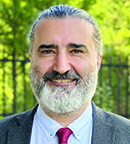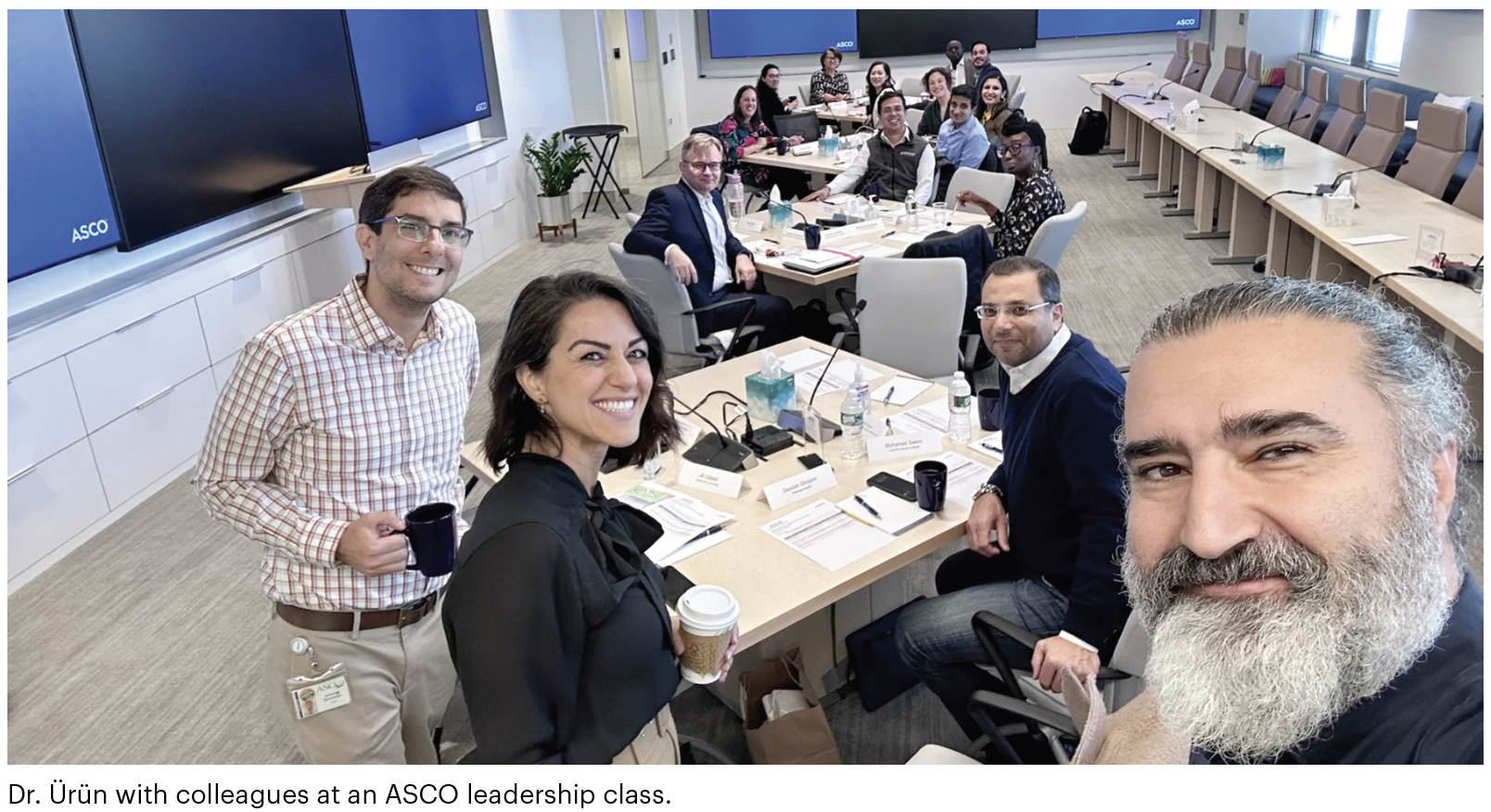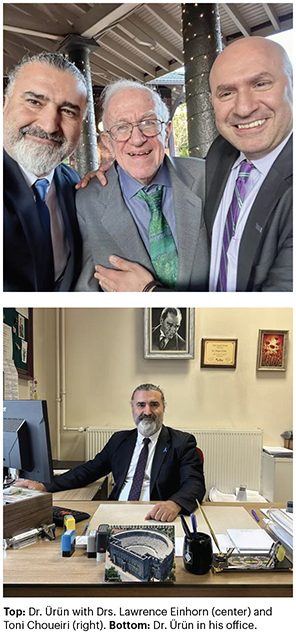In this installment of The ASCO Post’s Living a Full Life series, guest editor Jame Abraham, MD, FACP, spoke with medical oncologist Yüksel Ürün, MD, about his clinical and research career in oncology. Dr. Ürün is Professor of Medicine at the Ankara University School of Medicine in Turkey.
YÜKSEL ÜRÜN, MD

On social media and medicine: “As oncologists, we have a responsibility to share knowledge and help our colleagues wherever they practice medicine, which will ultimately translate to benefiting our patients. That’s the power of social media.”
On his fellowship at Dana-Farber: “I saw a diverse workforce and very talented medical professionals from around the world. It helped build strong feelings about the importance of creating a powerful global oncology network, so we can all improve our skills together.”
On participating in ASCO’s Leadership Development Program: “ASCO has put a lot of effort and investment into this program, and the experience was very special for me. Being a good leader is about advocacy, integrity, and collaboration.”
After pursuing a postdoctoral fellowship in genitourinary cancers at Dana-Farber Cancer Institute, in 2012 to 2013, Dr. Ürün returned to his home country of Turkey and established the Turkish Oncology Group Kidney Cancer Consortium Database. This database now includes approximately 1,500 patients with metastatic renal cell carcinoma from more than 15 cancer centers around the country. A prominent researcher in genitourinary cancers, Dr. Ürün has published more than 150 peer-reviewed articles, presentations, and book chapters. He also is a member of several international and national oncology organizations, including ASCO, the European Society for Medical Oncology, the European Organisation for Research and Treatment of Cancer (EORTC) Genito-Urinary (GU) Tract Cancer Group, and the Advanced Prostate Cancer Consensus Conference. Most recently, Dr. Ürün was selected to participate in ASCO’s Leadership Development Program class of 2023–2024 and successfully completed the course.
Sharing Knowledge
Dr. Abraham asked Dr. Ürün about his prolific presence on social media platforms and his interest in promoting diversity and equity in education and health care. He shared these thoughts: “What drives me to post to social media platforms is the response I get from colleagues like you who tell me how much they benefit from the information I post. I believe that oncology has no borders. Cancer has no borders. It affects people in every corner of the world. As oncologists, we have a responsibility to share knowledge and help our colleagues wherever they practice medicine, which will ultimately translate to benefiting our patients. That’s the power of social media.”
Why a Career in Oncology
Dr. Ürün was born in Kurtalan, a rural part of Turkey, and grew up in Aydin at a time when there was sparse local medical care, even for diseases that weren’t very serious. As a consequence, people had to travel far distances for both basic and intensive health care.
“I had an interest in medicine since I was a young child,” he shared. “Even during my first day of primary school, I always aimed to be a physician. Of course, my first desire was to help my family, specifically my mother. As I got older, I understood how disease and illness affect nearly everyone.”
Initially, his aim was to pursue a career in internal medicine, but during his residency, a personal encounter changed his mind. “I met a young man with testicular cancer,” Dr. Ürün related. “At the time, my experience with cancer was limited mostly to several family members who had been diagnosed with very advanced, incurable disease, and the only recourse for them was palliative care.”

Dr. Ürün continued: “After meeting this young patient, my supervisor gave me a copy of the National Comprehensive Cancer Network Clinical Practice Guidelines in Oncology (NCCN Guidelines®) on Testicular Cancer. It was the first time I had seen such a guideline, and after reading it, I learned how even in the advanced stage of disease, there was a chance to achieve a potential cure. The information was transformative for me, and I thought, even in metastatic, advanced solid tumors, cure is possible.”
For Dr. Ürün, testicular cancer became a model disease. “I wrote my internal medicine thesis on testicular cancer and decided to specialize in genitourinary cancers,” he explained. “I completed my medical oncology fellowship at Ankara University, one of the most prestigious institutions in the country. The experience was eye-opening for me in every way, and my mentors were always supportive.”

Combining Clinical Practice and Research
Dr. Ürün came to the United States in 2012 to pursue a fellowship at Dana-Farber Cancer Institute in Boston. “What I first noticed was the patient-centric care practiced at Dana-Farber, as well as the emphasis on research and continuing education,” he recalled. “At the time, I was under the mentorship of Dr. Toni Choueiri, now Director of the Lank Center for Genitourinary Oncology at Dana-Farber, who has become my lifelong mentor and friend. I was also exposed to many, many other giants in genitourinary cancers, including Drs. Philip W. Kantoff, Mary-Ellen Taplin, and Christopher Sweeney. Under Toni’s leadership, alongside many friends from all over the world, we have become a big family in GU cancers and still stay in touch.”
For Dr. Ürün, that early experience during fellowship is where he learned critical thinking and how to combine research and clinical practice. “I learned how to have a multidimensional perspective,” he said. “And, of course, I saw a diverse workforce and very talented medical professionals from around the world. It helped build strong feelings about the importance of creating a powerful global oncology network, so we can all improve our skills together.”
After fellowship, Dr. Ürün decided to translate what he learned at Dana-Farber and bring much of that knowledge to Turkey. He continued: “One of the great lessons I took away is that you cannot do everything all at once, because human and financial resources are limited. But rather than complain about what we don’t have, I decided to do the best with what we do have.”
Dr. Ürün continued: “In 2016, we created the Turkish Oncology Group Kidney Cancer Consortium Database, dedicated to my mentor, Dr. Choueiri. As previously mentioned, it now includes approximately 1,500 patients with metastatic renal cell carcinoma from more than 15 cancer centers around the country, and we are expanding the database to include the participation of new cancer centers.”
“Of course, we also have data we can extract from clinical trials,” he added, “but we know we cannot get all the answers we need from clinical trials alone. We can learn a lot from epidemiologic data about the pattern of disease, and it gives us a chance to improve care for our patients.”

Being Part of the Global Cancer Community
Dr. Ürün briefly discussed his role as Professor of Medicine at Ankara University School of Medicine in Turkey. “We have a comprehensive multidisciplinary oncology team that includes surgeons, medical oncologists, radiation oncologists, and pathologists, among others. Patients from all around Turkey, as well as from other parts of the world, come here for the best oncology care.”
He continued: “We also conduct robust clinical trials, including phase I trials, to ensure that we are able to bring additional treatment options to our patients, especially those with advanced-stage disease. I believe that patients in clinical studies do better than those not on clinical trials. And it’s important to publish our findings to share our data with the rest of the world and to learn how we can improve the design of clinical trials to best define the questions we hope to answer.”
Furthermore, Dr. Ürün briefly mentioned his efforts in global oncology. “We have international research collaborations, including with Toni Choueiri at Dana-Farber, as well as other American cancer centers and cancer centers throughout Europe. So, we feel we are part of the global oncology community, and we are always thinking about how we can contribute to the improvement of global oncology.”
Cost of Oncology Care in Turkey
Dr. Abraham asked Dr. Ürün to share some information on the cost of cancer care in his home country. “We have government-sponsored universal health-care coverage, and about 90% of the population has government insurance,” explained Dr. Ürün. “Any cancer treatment, imaging scan, and laboratory test that is approved by the Turkish Medicines and Medical Devices Agency (TMMDA) is reimbursed by the government, so approved cancer treatment is free for all patients in state-run hospitals.”
However, sometimes, it can take between 2 and 5 years for drugs approved in the United States to receive approval in Turkey, he noted. “Therefore, clinical trials are crucial for early access to these treatments,” Dr. Ürün explained. “For prostate cancer, for example, most of the new treatments, including abiraterone acetate, enzalutamide, and apalutamide, are approved by the TMMDA and are available to patients. Of course, conventional chemotherapies, such as docetaxel and carboplatin/paclitaxel combinations, have been approved and available for nearly a decade.”
Dr. Ürün continued: “Unfortunately, new cancer treatments that are not yet approved by the TMMDA are available only at pharmacies and are not reimbursable, so patients have to pay out-of-pocket costs, and that can be expensive—and out of reach—for some patients. But generally, the essential cancer drugs on the World Health Organization Model Lists of Essential Medicines are available for most patients at no cost. It can just take time for new drugs to be approved.”
Developing Leaders in Oncology
Dr. Abraham asked Dr. Ürün what it was like to participate in ASCO’s Leadership Development Program. “First, I want to thank ASCO for this opportunity,” he began. “ASCO has put a lot of effort and investment into this program, and the experience was very special for me. I feel so fortunate to have been accepted into the program. We don’t learn valuable leadership skills in medical school, but at the end of the day, being a good leader is about how to bring the best treatment options to your patients. Being a good leader is about advocacy, integrity, and collaboration.”
Guest Editor

Jame Abraham, MD, FACP
Dr. Ürün shared additional comments: “Being in the program widened my vision. As a physician, of course, you treat each patient one by one as an individual. In leadership, you learn how to improve the care of many patients. The program also offered me an opportunity to network with and receive mentorship from ASCO leaders as well as to gain exposure to ASCO committees. Now, I feel like one of ASCO’s ambassadors in the region.”
When Dr. Abraham asked Dr. Ürün about the importance of having a work/life balance, he offered these thoughts: “The amount of energy we have is not infinite. Sometimes, we need to recharge ourselves to be able to do our job better and not get burned out. During my early years as an oncologist, I always felt I had to work harder to succeed. But what I’ve learned during my life, and during this leadership program, is you have to strike a balance between your professional and personal lives. To me, thriving in life means being surrounded by a loving family and supportive friends who lift you up, share your joys, and stand by you in tough times. Their warmth and encouragement bring balance, motivation, and meaning to both my work and personal life.
Dr. Ürün shared some of the ways he relaxes when not at work. “I enjoy reading and also taking nature walks. Being in nature is a great healer for me. Taking a walk and feeling the wind in my face makes me feel reborn and brings a sense of peace to my soul. Focus on what you can do and run—both toward your goals and for your health. Every step counts, literally and figuratively! It’s my way for stress management!”
Working Toward the Same Goals
Dr. Abraham asked Dr. Ürün whether he had any advice for young oncologists, and he shared these thoughts: “I would say dream big, live your dream, and be persistent—and don’t worry about failure. There is no failure if you do your best and contribute to the global oncology community.”
ASCO has a Virtual Mentoring Program (https://society.asco.org/virtual-mentoring-program), which pairs members with a mentor outside their institution to address the unmet career development needs of oncologists in training, as well as practicing oncologists, underrepresented populations in medicine, and female oncologists. “My personal advice is not to be shy and to ask for help. We are all working toward the same goals.”
DISCLOSURE: Dr. Ürün reported no conflicts of interest.

